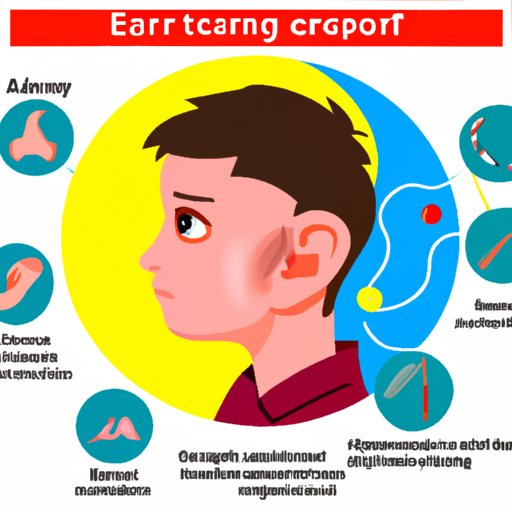Introduction
An ear infection is an inflammation of the middle ear caused by bacteria or viruses. It is a very common condition, particularly in children, and it is usually accompanied by pain, fever, and difficulty hearing. Ear infections can be mild and resolve on their own, or they can be more severe and require medical intervention. Knowing the signs and symptoms of an ear infection can help you determine if you or your child need to see a doctor.
Identifying Signs and Symptoms of an Ear Infection
The most common symptom of an ear infection is pain inside the ear, which can range from a mild ache to a sharp, stabbing sensation. Other symptoms include discharge from the ear, fever, difficulty hearing, swelling in the ear, and itching inside the ear. Children may also tug at their ears, become irritable, and have difficulty sleeping. In some cases, fluid drainage from the ear may indicate a more serious infection.

Consulting a Doctor to Diagnose an Ear Infection
If you suspect that you or your child has an ear infection, it’s important to consult a doctor to get a proper diagnosis. Your doctor will examine the ear and look for signs of infection, such as redness, swelling, and fluid drainage. They may also use a device called an otoscope to look inside the ear and check for any abnormalities. Depending on the severity of the infection, your doctor may order additional tests, such as a CT scan or blood test.

Understanding Risk Factors for Ear Infections
Certain factors can increase your risk of developing an ear infection. Age is a major factor; young children are more likely to experience ear infections because their immune systems are still developing. Allergies, immunodeficiency, and swimming can also increase the risk of an ear infection. It’s important to identify and address any underlying conditions that may be contributing to the problem.
Examining the Causes of Ear Infections
Ear infections are typically caused by bacteria, viruses, or fungi. Bacterial infections are the most common type of ear infection. Viral infections are less common but can be more serious. Fungal ear infections are rare but can occur in people with weakened immune systems.

Exploring Treatment Options for Ear Infections
Treatment for an ear infection depends on the type and severity of the infection. For mild cases, antibiotics may not be necessary. Over-the-counter medications, such as ibuprofen and acetaminophen, can help reduce pain and fever. Natural remedies, such as warm compresses, may also provide relief. In more severe cases, antibiotics may be prescribed to treat the infection.
Knowing When to Seek Medical Attention for an Ear Infection
Most ear infections will resolve on their own without medical intervention. However, if you or your child experience severe pain or fever, persistent drainage from the ear, or hearing loss, it’s important to seek medical attention. Your doctor may prescribe antibiotics or other medications to treat the infection.
Conclusion
An ear infection is a common condition that can cause pain, fever, and difficulty hearing. Knowing the signs and symptoms of an ear infection can help you determine if you or your child need to see a doctor. Risk factors, such as age and allergies, may also increase the likelihood of an ear infection. Treatment options vary depending on the type and severity of the infection. If you experience severe pain or fever, persistent drainage from the ear, or hearing loss, it’s important to seek medical attention right away.
(Note: Is this article not meeting your expectations? Do you have knowledge or insights to share? Unlock new opportunities and expand your reach by joining our authors team. Click Registration to join us and share your expertise with our readers.)
